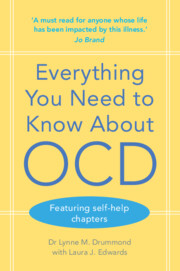Book contents
- Everything You Need to Know about OCD
- Reviews
- Everything You Need to Know about OCD
- Copyright page
- Contents
- Preface
- Acknowledgements
- 1 What Is OCD and Is It Really a Problem?
- 2 Who Gets OCD and How Would Anyone Know if They Had It?
- 3 Types and Presentation of OCD
- 4 Drug Treatment
- 5 Exposure and Response Prevention for OCD
- 6 Children and Adolescents with OCD
- 7 Old Treatments, Modern Developments, New Research, and Potential Treatments for the Future
- 8 Other Conditions Which Appear Similar to OCD
- 9 What Can Family and Carers Do to Help a Person with OCD?
- 10 What Can You Do to Help Cope with Your OCD?
- 11 General Principles of Treatment
- 12 How to Better Manage Your Symptoms Before and During Treatment
- 13 Overcoming Fears of Contamination
- 14 Fear of Harm to Self or Others Due to Failure to Act
- 15 Fear of Harm to Self or Others Due to Your Own Actions (or Thoughts)
- 16 Overcoming ‘Taboo’ Obsessive Thoughts
- 17 Loss of Something (Objects or Part of ‘Self’)
- 18 Overcoming Obsessive-Compulsive Slowness, Perfectionism and Symmetry
- 19 Overcoming Obsessive Ruminations (Sometimes Known as ‘Pure O’)
- 20 When the Treatment Doesn’t Go According to Plan or Even If It Does, What to Do Next
- Appendix
- Glossary
- Resources
- References
- Index
8 - Other Conditions Which Appear Similar to OCD
Published online by Cambridge University Press: 27 May 2022
- Everything You Need to Know about OCD
- Reviews
- Everything You Need to Know about OCD
- Copyright page
- Contents
- Preface
- Acknowledgements
- 1 What Is OCD and Is It Really a Problem?
- 2 Who Gets OCD and How Would Anyone Know if They Had It?
- 3 Types and Presentation of OCD
- 4 Drug Treatment
- 5 Exposure and Response Prevention for OCD
- 6 Children and Adolescents with OCD
- 7 Old Treatments, Modern Developments, New Research, and Potential Treatments for the Future
- 8 Other Conditions Which Appear Similar to OCD
- 9 What Can Family and Carers Do to Help a Person with OCD?
- 10 What Can You Do to Help Cope with Your OCD?
- 11 General Principles of Treatment
- 12 How to Better Manage Your Symptoms Before and During Treatment
- 13 Overcoming Fears of Contamination
- 14 Fear of Harm to Self or Others Due to Failure to Act
- 15 Fear of Harm to Self or Others Due to Your Own Actions (or Thoughts)
- 16 Overcoming ‘Taboo’ Obsessive Thoughts
- 17 Loss of Something (Objects or Part of ‘Self’)
- 18 Overcoming Obsessive-Compulsive Slowness, Perfectionism and Symmetry
- 19 Overcoming Obsessive Ruminations (Sometimes Known as ‘Pure O’)
- 20 When the Treatment Doesn’t Go According to Plan or Even If It Does, What to Do Next
- Appendix
- Glossary
- Resources
- References
- Index
Summary
This chapter examines a range of conditions which are often mistaken for OCD and which have similarities with OCD. There will be a brief mention of how these can be treated, and the evidence for both drug therapies and cognitive behavioural therapy (CBT) is also discussed. Personal stories are also presented. The conditions covered will include the following:
Body dysmorphic disorder (BDD): This section on BDD will examine the similarities between OCD and BDD, but also some of the differences. It will also examine the evidence for drug treatment and how the evidence suggests that higher dosages of selective serotonin reuptake inhibitors (SSRIs) are more likely to be needed in BDD. CBT treatment usually involves exposure and response prevention (ERP), but there is also usually a greater need to examine some of the underlying beliefs and the causes of low self-esteem, which is common in people with BDD.
Hoarding disorder: There has been relatively little research into the area of hoarding disorder because this condition has only recently been recognised and come to prominence. Compared to people with OCD, people with hoarding disorder are more likely to be older and to be living alone. Although little is known about hoarding disorder, research suggests that some drugs may be useful, as might CBT aimed at helping the individual to stop acquiring new items whilst discarding old items.
Tourette syndrome: This condition is often accompanied by OCD symptoms. We will explore what this syndrome is and how it may be treated.
Hair pulling (trichotillomania): This is a condition which has only recently been recognised as a separate psychiatric condition. There is a general lack of research in this area. Current treatment will be discussed.
Skin picking: Again, this is a condition with little general recognition and little research. The severity of this condition can range from trivial to devastating and even life-endangering. Current research and treatment will be discussed.
Health anxiety: Health anxiety has many similarities to OCD. There are intrusive, unwanted, worrying thoughts that the person has a serious disease. This worry causes high anxiety, and the person tries to abate this by performing a number of checks on themselves, by researching the Internet repeatedly, or by seeking reassurance from medical professionals or friends and family. Repeated trips to medical facilities can sometimes result in extreme and excessive investigation with little evidence to support any serious physical pathology.
- Type
- Chapter
- Information
- Everything You Need to Know About OCD , pp. 123 - 156Publisher: Cambridge University PressPrint publication year: 2022

